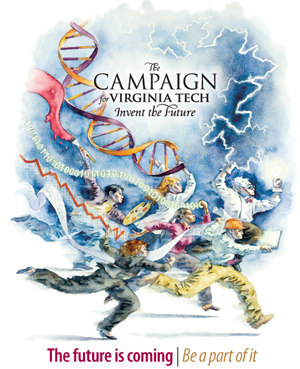 |
|
|
by Albert Raboteau
What do all of the above have in common? They illustrate the difference that private giving can make at a university like Virginia Tech.
The 71,000 individuals who participated in Making a World of Difference allowed it to exceed its $250 million goal by a considerable margin--$337 million was raised. As a result of that campaign, 922 new endowments were created for scholarships, professorships, and programs. Although that is an impressive figure, the real story of what that campaign did--and what The Campaign for Virginia Tech: Invent the Future is already doing--goes beyond the numbers. The campaign's success lies in the accomplishments of such people as Percival Zhang, assistant professor of biological systems engineering, who has made the most of his laboratory space in Latham Hall. The hall was named in honor of William and Elizabeth Latham, members of the National Campaign Steering Committee, whose longstanding support of the university includes a $5 million gift to support research in the College of Agriculture and Life Sciences (CALS). The U.S. Air Force recently announced that Zhang, a CALS faculty member, will receive one of its Young Investigator Research Program grants. The grant will further Zhang's work to convert plant sugars to hydrogen, a step toward more efficient, cleaner-burning engines that run on plant matter instead of fossil fuels. Zhang, who shared lab space before room in Latham Hall became available to him, notes that the new facility has "made a difference for me." Craig Nessler, CALS associate dean for research, says that Latham Hall has become a gathering place where faculty members from different departments are discovering how their individual research interests can complement the work of colleagues. "We have the ability to share equipment," Nessler adds. "We have the ability to share ideas, and we have the ability for our students to interact with a variety of faculty." University officials, who want all research deans to be able to say the same thing, have set a $130 million fundraising target that will improve research infrastructure by providing new equipment and buildings and the means to make renovations to existing structures. At the same time, a $182 million goal has been set for increasing academic excellence at the university by boosting the number of faculty chairs and fellowships, named professorships, and graduate fellowships. Such positions help the university to both attract and retain the most talented researchers and teachers. Andrew Archut (history '07) is another example of the impact of private giving on the university. The Virginia Tech Corps of Cadets Emerging Leaders Scholarship recipient, who graduated magna cum laude from the university and with honors from the U.S. Marine Corps' Officer Candidates School, plans to put his considerable talents to use as an intelligence officer specializing in Middle Eastern and Arabic affairs. An Ashburn, Va., native, Archut was recognized as Virginia Tech's Undergraduate Leader of the Year for 2007. He has been commissioned as a second lieutenant. "I strive to lead by example because as a leader, everything I do or say--or fail to do or say--will set the tone for this regiment," Archut once noted as a cadet.
The corps of cadets, 80 percent of whose graduates become commissioned officers, is seeking to increase its membership by 25 percent to 1,000 cadets. Corps officials view scholarships as an important tool for reaching that goal. And the corps is not alone in looking to increase the amount of assistance it can provide. Across all university programs, Virginia Tech officials are raising money for scholarships to enhance the undergraduate experience--one of the major priorities of The Campaign for Virginia Tech: Invent the Future. The rationale is that scholarships not only allow talented students to attend regardless of their economic circumstances, they also draw the highest-caliber students, who have many schools from which to choose. Frequently, such students become leaders, like Archut, and improve the university by their presence. Through the discoveries made by faculty and students and the future leaders it produces, the university's influence stretches far beyond campus. Arguably, however, nowhere is the university's footprint more visible than in southwestern Virginia, where Virginia Tech serves as an economic and cultural engine. In embracing that role, the university has set an $81 million goal to enhance its impact on the community. Donors can help by continuing to support the athletic programs that draw national attention to Virginia Tech and help unite the Hokie Nation. Supporters of the campaign will also play a key role in the renovation of key campus landmarks, such as Solitude and Lane Hall. Private support also will be vital in realizing the university's longstanding goal to increase the prominence of the arts on campus. Officials envision an $82.2 million Center for the Arts complex that would include a renovated Shultz Hall and two new buildings: a 1,300-seat performance hall and a visual arts gallery.
Additionally, Steger has noted, "We owe students more than a preparation for life at work. We owe students the opportunity and means to educate themselves beyond work and after work. To that end, a new home for the fine and performing arts will culturally enrich the lives of our students and the entire university community as well." By supporting any of the goals of The Campaign for Virginia Tech: Invent the Future, alumni and friends of the university can help ensure an even brighter tomorrow for students, faculty, staff, alumni, and citizens of the commonwealth and the world alike.
|
||||||||||||||||||||||||||||||||||||||||||||||||||||||||||||



